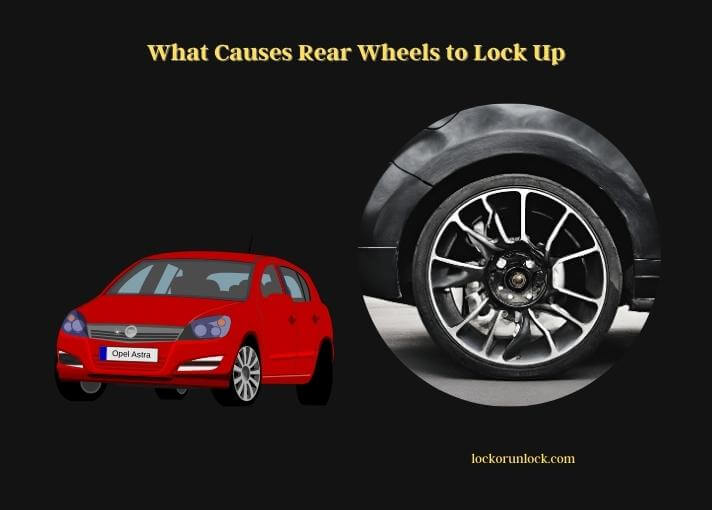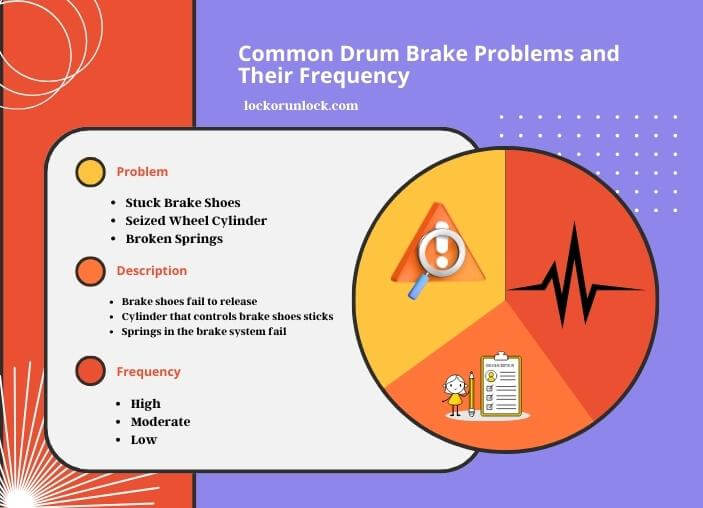Rear wheels locking up can be caused by several mechanical issues, ranging from brake problems to differential malfunctions. This issue can occur in various circumstances, such as after a vehicle has been sitting for a while or during a turn.
The locking up of rear wheels is often attributed to brake-related problems. For instance, if one rear wheel locks up, it might be due to a seized brake caliper or a collapsed brake hose. In cases where the vehicle has been stationary for an extended period, the brakes may rust or seize, especially in drum brake systems, leading to the rear wheels locking up. This is particularly common in older vehicles or those exposed to moist or corrosive environments.
Differential issues can also cause rear wheels to lock up. The differential is crucial in allowing the wheels to rotate at different speeds, particularly when turning. If the rear differential locks up, it can result in both rear wheels becoming immobile. This is often a more complex and serious issue than brake-related problems.

In terms of solutions, unlocking back wheels depends on the underlying cause. For brake-related issues, it might involve replacing or repairing the brake calipers, hoses, or drum brake components. If the problem is with the differential, more extensive mechanical work is usually required.
For those experiencing a front tire locking up, the causes are similar but pertain to the front wheel mechanisms. It’s essential to address these issues promptly to ensure safe driving conditions.
For a more detailed understanding of these issues and their solutions, we invite you to read the comprehensive article below. It provides in-depth insights into the causes and remedies for rear wheel lock-up scenarios, helping you keep your vehicle in optimal condition.
Rear Wheels Locking Up – Causes and Solutions
Overview of Rear Wheel Lock-Up
Definition and Basic Understanding
Have you ever wondered what happens when your car’s rear wheels suddenly refuse to move? This phenomenon, known as rear wheel lock-up, can be a startling experience. It occurs when the wheels stop rotating while the vehicle is still in motion, often leading to a loss of control. Understanding this issue is key to maintaining your vehicle’s safety and performance.
Significance in Vehicle Safety
The safety implications of rear wheel lock-up are significant. It can lead to skidding, loss of vehicle control, and in severe cases, accidents. That’s why it’s essential for drivers to recognize the signs and know the potential causes. By staying informed, you can take proactive steps to prevent this dangerous situation.
Brake System Issues Leading to Wheel Lock-Up
Drum Brake Complications
Drum brakes, common in older vehicles, are prone to various issues that can cause wheel lock-up. Problems like stuck brake shoes or a malfunctioning wheel cylinder can lead to the brakes engaging unintentionally. Let’s look at some common drum brake problems and how often they occur.
Common Drum Brake Problems and Their Frequency
| Problem | Description | Frequency |
| Stuck Brake Shoes | Brake shoes fail to release | High |
| Seized Wheel Cylinder | Cylinder that controls brake shoes sticks | Moderate |
| Broken Springs | Springs in the brake system fail | Low |

Disc Brake Malfunctions
Disc brakes, found in most modern vehicles, are not immune to problems either. Issues like a seized caliper or a damaged brake hose can cause the brakes to engage without driver input, leading to wheel lock-up. Regular maintenance is crucial to prevent these issues.
Emergency Brake System Faults
The emergency brake, also known as the parking brake, can contribute to rear wheel lock-up if it becomes stuck in the engaged position. This is often due to a lack of use or corrosion. Regular use and inspection can keep the emergency brake functioning correctly.
The Role of the Differential in Wheel Movement
Function of the Differential
The differential plays a crucial role in your car’s ability to turn smoothly. It allows the wheels to rotate at different speeds, which is essential during turns. A well-functioning differential is key to preventing wheel lock-up.
Differential Lock-Up: Causes and Effects
When the differential locks up, it forces both wheels to turn at the same speed, which can lead to wheel lock-up, especially during turns. This can be caused by internal gear failure or lack of proper lubrication.
Differential Failures and Related Wheel Lock-Up Incidents
| Failure Type | Description | Related Incidents |
| Gear Failure | Broken or worn gears in the differential | High |
| Lubrication Issues | Insufficient or old lubricant | Moderate |
Environmental and External Factors
Impact of Weather and Moisture
Weather conditions, especially moisture, can significantly impact your vehicle’s brake system. Prolonged exposure to moisture can lead to rust and corrosion, particularly in drum brakes, leading to wheel lock-up.
Corrosion and Wear: Long-Term Effects
Over time, corrosion and wear can degrade brake components and the differential system. This degradation can lead to sudden failures, resulting in the rear wheels locking up. Regular inspections can help identify these issues early on.
Specific Scenarios of Wheel Lock-Up
During Long Periods of Inactivity
Vehicles that sit unused for extended periods are prone to brake and differential issues due to rust and corrosion. This is a common reason for rear wheels locking up when the vehicle is moved after a long period of inactivity.
While Turning: Differential vs. Brake Issues
Wheel lock-up during turning is often a telltale sign of differential problems. It can also be caused by brake issues. Identifying the exact cause requires a thorough inspection.
Unique Case: One Wheel Locking Up
If only one rear wheel locks up, it’s typically a sign of a localized issue, such as a seized brake caliper or a collapsed brake hose in disc brake systems. This requires immediate attention to prevent further damage.
Diagnosing Rear Wheel Lock-Up
Professional vs. DIY Diagnosis
While some drivers are comfortable diagnosing issues themselves, others prefer professional help. Knowing your limits is key. If you’re unsure, it’s always safer to consult a professional.
Tools and Techniques for Identification
Various tools can help diagnose rear wheel lock-up, from simple visual inspections to more advanced diagnostic equipment.
Diagnostic Tools and Their Effectiveness
| Tool | Use | Effectiveness |
| Visual Inspection | Checking for visible signs of wear and damage | High |
| OBD Scanner | Reading vehicle error codes | Moderate |
| Brake Fluid Tester | Checking brake fluid quality | Low |
Repair and Prevention Strategies
Common Repairs for Brake and Differential Issues
Repair strategies vary based on the issue. For brake problems, it might involve replacing brake pads or calipers. Differential issues might require more complex repairs, like gear replacement or lubrication.
Preventative Maintenance Tips
Regular maintenance is the best way to prevent rear wheel lock-up. This includes regular brake inspections, fluid changes, and ensuring the differential is well-lubricated and in good condition.
FAQs
Can ABS Malfunction Cause Rear Wheels to Lock Up?
Yes, a malfunction in the Anti-lock Braking System (ABS) can lead to rear wheels locking up. The ABS is designed to prevent wheel lock-up during emergency braking by rapidly pulsing the brakes. If this system fails, it can either cause the brakes to lock up or not engage properly. This is often due to faulty ABS sensors, damaged wires, or issues within the ABS control module. Regular checks and maintenance of the ABS system, including its sensors and wiring, are vital for preventing such issues.
Can Air in Brake Lines Cause Rear Wheels to Lock Up?
Air in brake lines can definitely lead to rear brakes locking up. When air enters the brake system, it can cause a spongy brake pedal and decrease the effectiveness of the brakes. This can result in uneven braking pressure and ultimately lead to rear wheels locking up, posing a serious safety concern.
Is Tire Tread Wear Linked to Wheel Lock-Up?
Uneven or excessive tire tread wear can contribute to rear wheel lock-up. When tires are worn unevenly, they may not provide consistent grip on the road surface. This inconsistency can cause one or more wheels to lock up under braking, especially in wet or slippery conditions. Regular tire inspections and maintaining proper tire pressure are essential. Also, addressing alignment issues and rotating tires as recommended can prevent uneven wear and reduce the risk of wheel lock-up.
Do Tacomas with locking differentials prevent rear wheels from locking up?
Yes, Tacomas with locking differential options prevent rear wheels from locking up. This feature is especially helpful when driving on uneven terrain, as it allows for better traction and control. Overall, Tacoma locking differential options provide added security and improved off-road capabilities.
Can Overloading a Vehicle Cause Rear Wheels to Lock Up?
Overloading a vehicle can indeed cause the rear wheels to lock up. Excessive weight puts additional strain on the vehicle’s braking system. The brakes may overheat and lose effectiveness, leading to increased stopping distances and potential wheel lock-up. It’s crucial to adhere to the vehicle’s weight capacity as specified by the manufacturer. Distributing weight evenly and avoiding overloading are key practices to ensure safe braking and prevent rear wheel lock-up.
Does Brake Fluid Quality Affect Wheel Lock-Up?
The quality of brake fluid significantly affects the likelihood of rear wheel lock-up. Old or contaminated brake fluid can lead to reduced braking efficiency. Over time, brake fluid absorbs moisture, which can cause corrosion in the brake system and lead to brake failure or lock-up. It’s recommended to change the brake fluid at intervals specified by the vehicle manufacturer, usually every two years, to maintain optimal brake performance and prevent wheel lock-up.
Can Parking on an Incline Cause Rear Wheels to Lock Up?
Parking on an incline, especially for extended periods, can sometimes lead to rear wheel lock-up. This is particularly true if the parking or emergency brake is heavily relied upon to keep the vehicle stationary. The prolonged tension can cause the brake components to stick or seize, especially in older vehicles or in cold weather. To prevent this, it’s advisable to use wheel chocks on steep inclines and ensure the parking brake is regularly released and applied to keep the components moving freely.
How Does Brake Pad Glazing Affect Wheel Lock-Up?
Brake pad glazing, which occurs when brake pads become excessively hard and smooth, can lead to rear wheel lock-up. This usually happens due to overheating from constant, hard braking. Glazed pads cannot grip the rotor effectively, leading to decreased braking performance and potential lock-up. To prevent this, avoid aggressive braking habits, and have your brake pads checked regularly for signs of glazing. Replacing glazed pads promptly is essential for maintaining effective braking.
Can Incorrect Brake Installation Cause Wheel Lock-Up?
Incorrect installation of brakes can certainly lead to rear wheel lock-up. If brake components like pads, calipers, or rotors are improperly fitted, it can result in uneven braking pressure and potential lock-up. This is often seen after brake servicing if the work is not done correctly. It’s crucial to have brake work performed by a qualified technician and to ensure that all components are correctly installed and functioning as intended. Regular post-service checks can also help identify and rectify any installation issues before they lead to a problem.
Rear wheel lock-up can be a daunting issue, but understanding its causes and solutions is the first step in prevention. Regular maintenance and being aware of the signs can help you avoid this problem. Remember, safety comes first, and addressing these issues early can save you from a potentially dangerous situation on the road.
